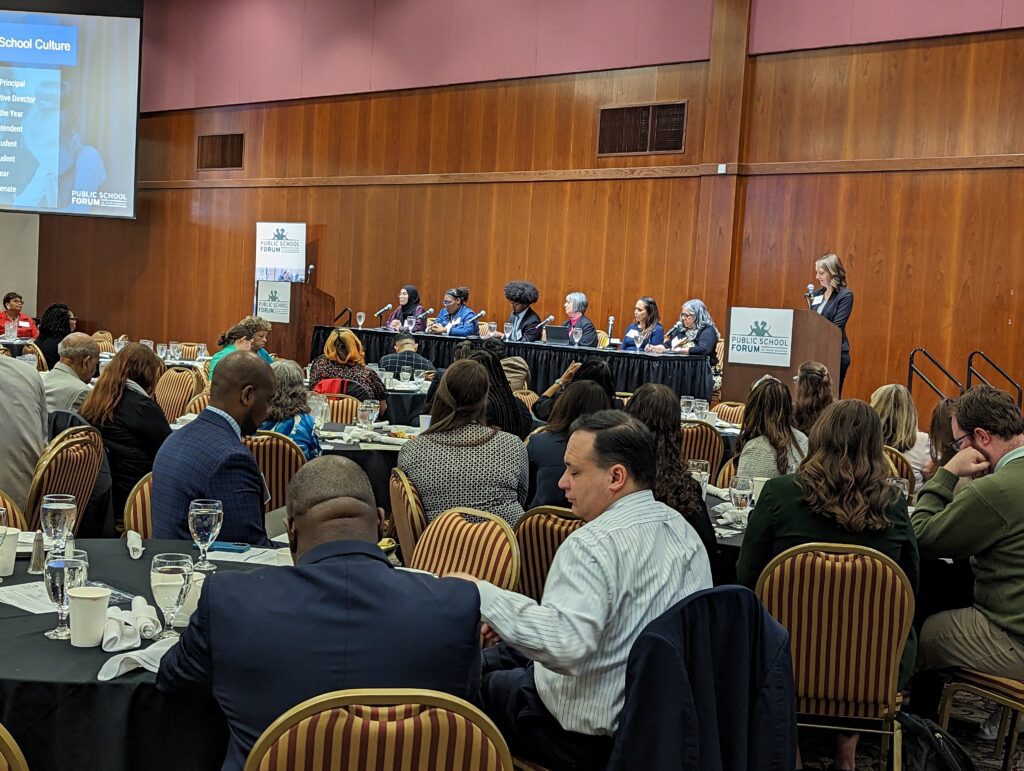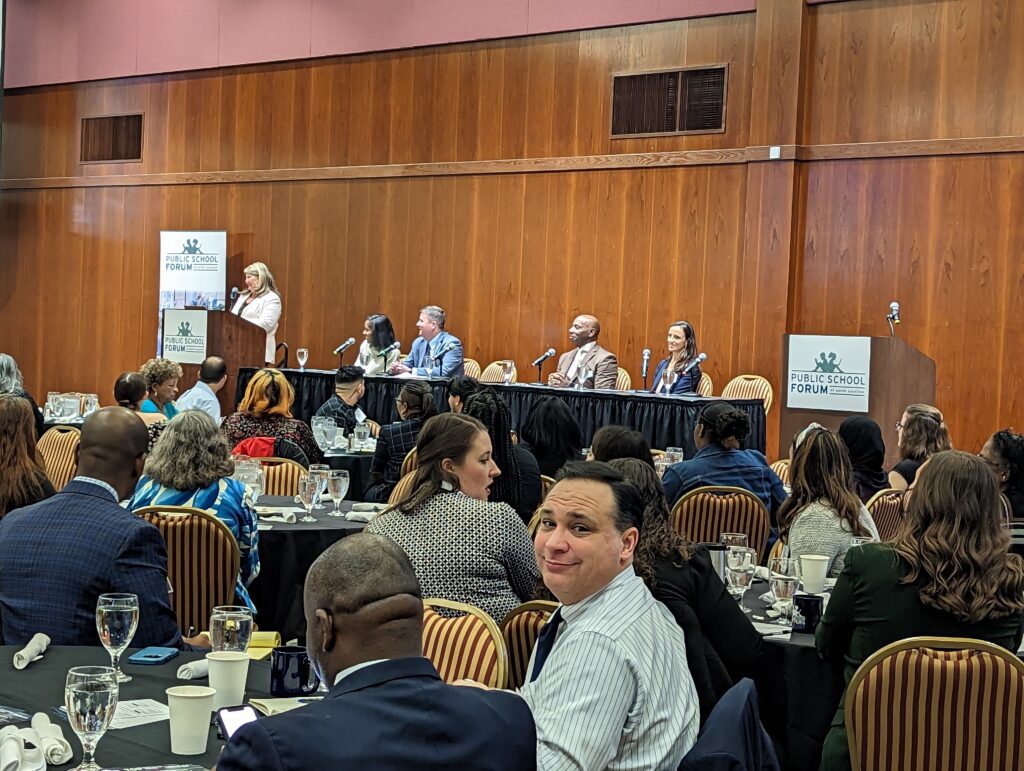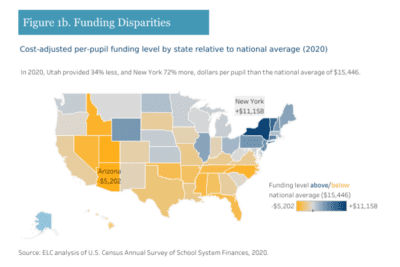
|
|
North Carolina was recently named the number one state for business in the country, but the state is at the bottom of another important list, Public School Forum of North Carolina Executive Director Mary Ann Wolf said.
“North Carolina is 48th in per-pupil expenditure and dead last in funding effort when adjusted for reasonable cost differences,” she said. “North Carolina prides itself on being a state that is known for being business friendly. But what if we could also take pride in being known for how we value public education?”
The Public School Forum’s annual Eggs & Issues breakfast brings together stakeholders to discuss the top issues in education, and this year’s event on Jan. 31 touched on a variety of topics, from teacher recruitment and retention to mental health and workforce preparation. At the heart of all these discussions, many speakers argued, is teacher compensation.
Teacher compensation is one of the Public School Forum’s main advocacy issues for 2023-24. Here are their five top education issues:
- Ensure fair and competitive compensation for educators.
- Grow, retain, and diversify the teacher pipeline.
- Address the root causes of mental health and school safety crises.
- Prepare students for the world they live in.
- Implement, monitor, and evaluate the Comprehensive Remedial Plan.
Some of the group’s policy recommendations include raising teacher pay by 24%, reinstating master’s pay, raising pay for school mental health support personnel, and eliminating teacher licensure exams.
See the full policy recommendations below.
“This is all about kids — their now and their future, their families and their communities, and also their state,” Wolf said at the event.
She urged those in attendance to “keep students at the center of our discussions, policy, and legislation.”
Several of the policies recommended by the Public School Forum are in the works. For example, one of their recommendations is to replace the current school accountability system with one that includes multiple measures.
School grades are currently calculated using a formula that is 80% academic proficiency and 20% academic growth, both of which rely on test scores. The N.C. Department of Public Instruction has been working on reforming the school accountability model and is close to having a proposal ready.
A state commission is also working on a plan to reform how teachers are licensed and paid, which proponents of the plan argue would help with both teacher compensation and recruitment. The current draft plan would raise starting salaries for teachers and introduce alternative pathways to licensure.
And the N.C. Supreme Court recently ruled that the state must fund years two and three of the Leandro Comprehensive Remedial Plan, but the case likely has a long way to go still. The case is supposed to go back to the trial court to determine just how much funding will be required, and a new judge has also been assigned to the case. Since the ruling came down last year, the N.C. Supreme Court has shifted from a Democratic majority to a Republican majority, and it’s possible the case could get sent back up and heard again.


This was the first in-person Eggs & Issues since before the pandemic began, and as panelists discussed teacher retention, mental health, and school culture, it was clear how much has changed for schools and educators.
“We will never really understand the impact the pandemic has played on our education profession, and on those, in particular, who want to go into teaching,” Union County Public Schools Superintendent Andrew Houlihan said.
He said his district didn’t have much trouble recruiting teachers until two years ago.
The issues of teacher pay and working conditions were brought up again and again throughout the event, and the emphasis was not just on living wages for teachers but “professional wages.”
Nadja Young, education practice director at SAS, explained that she took a pay cut when she came to North Carolina from Colorado.
“The average teacher pay (in North Carolina) is approximately $11,000 below the national average, based on the most recent estimates,” she said. “We saw earlier that our starting salary is around $37,000. When I began teaching in Colorado over 20 years ago, my starting salary was $36,000.”
Speakers acknowledged that raising salaries to where they believe they should be would require a huge investment. But they said it’s necessary to compete with rising inflation and the cost of living, as well as what other states are paying their teachers.
On the issue of recruitment and retention, Anthony Jackson, superintendent of Chatham County Schools, asked if the state was trying to solve post-pandemic challenges with pre-pandemic strategies.
His district is in a community that’s growing rapidly, thanks in part to the recent business expansion in the county. He said educational investments should be viewed the same way as business investments.
“We’re very transactional in public education: we’re going to give you this, and we expect that,” he said. “I’m going to challenge us to become far more transformational in our conversation, much like we do when we recruit businesses: we’re going to invest in you with the hope that down the road, we’re going to get what we need, and we’re going to get what we expect.”
Sen. Michael Lee, R-New Hanover, brought up a provision in the most recent biennium state budget that allocated $100 million for local salary supplements. He said this was meant to help with some of these concerns about pay, especially for districts that have fewer resources.
He also said the state needs to look at the teacher pipeline and support initiatives like residency and pathways programs.
Conversation also centered on school safety and mental health. Speakers emphasized that the issue goes beyond school resources officers (SROs) to having adequate resources in the building for students’ social and emotional health.
“We have to meet those first priority needs of shelter, food, all of the care that students need,” North Carolina Beginning Teacher of the Year Xavier Adams said. “And unfortunately, we’re taking these items away from our students. We’re already directly contributing to our students lack of well-being when we’re taking away their free lunch, and the fact that they’re required to still be there every day.”
When we think about safety, a lot of times we immediately jump to the gun violence issue, we immediately jump to the SRO issue,” he continued. “But with mental health, we really have to address the whole student.”
Speakers pointed out that mental health challenges existed before the pandemic, but they have grown in recent years. They emphasized the need for school counselors, social workers, and professional development for teachers to meet students’ needs.
“If you have a six-year-old throwing a chair in their classroom, that’s an underlying issue — with regards to not even just being a behavioral problem, but there’s probably trauma and a lot of other things that go on in the household,” Sen. Sydney Batch, D-Wake, said.
Batch said in-school resources can serve all students.
“We have kids who don’t have health insurance and access to health insurance, and even those who do have private health insurance for mental health services, it’s expensive,” she said. “The copay is $50 a week… Most families cannot afford $50 a week for a copay.”
Some school leaders lifted up strategies they’re using. Durham Public Schools, for example, is building a student mental health ambassadors program for students, caregivers, and teachers to provide resources and destigmatize mental health.
Two Duplin County Schools students, Bushra Elfgee and Onesty Sutton, shared how they started clubs at their schools to give students an outlet to talk about their challenges and get support.
Addressing legislators, 2021 North Carolina Teacher of the Year Eugenia Floyd put it simply: “I want y’all to move like educators.”
The state can both address current challenges and innovate. She said educators adapted quickly when school became virtual, and she is calling on leaders to do the same.
Editor’s note: Anthony Jackson is a member of EdNC’s Board of Directors.




